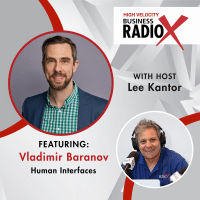Coaching Founders Through Questions, Not Answers
I was recently interviewed about my work as a founder coach at Human Interfaces, and the conversation reminded me why I made the shift from building companies to coaching the people behind them. My journey began in engineering, moved through finance and aerospace, and eventually led me here—helping founders navigate the human side of building businesses.
From Building Companies to Building Leaders
I spent 15 years in finance, where I co-founded a SaaS wealth management platform that grew from two of us to 150 people before it was acquired. Later, I joined an aerospace startup as the third employee and helped it grow to 35 people while securing major government contracts and even launching two instruments into space. Those experiences taught me the exhilaration of scaling companies and also the strain it puts on leaders.
At a certain point, I realized I wanted to maximize impact in a different way. I like to say I was searching for my “pivot point,” borrowing from Archimedes—coaching became my lever. By working with many founders rather than just building one company, I could multiply outcomes and help others succeed on a much larger scale.
Why Coaching, Not Consulting
People often ask why I chose coaching over consulting. For me, consulting starts with a predetermined problem and a ready answer. Coaching is different—it’s about discovery, curiosity, and helping clients uncover their own clarity through the Socratic method.
One analogy I often share: I could teach someone to catch tuna in a pond, but their reality may require catching shark in the ocean. My role is not to impose my experience but to equip clients with the questions and tools that help them succeed in their own unique context.
Who I Work With
I typically see two types of clients. The first are pre-idea founders—people who feel the pull to create but aren’t sure where to start. The second are leaders running businesses who suddenly find themselves overwhelmed as their teams and ambitions grow.
There are common signals that coaching might help:
-
Overwhelm — too much on their plate and no clear way to prioritize.
-
Isolation — needing a confidential space to process decisions they can’t share with team or investors.
-
Getting started — uncertainty, fear, or inexperience keeping them from taking the first step.
When these symptoms show up, coaching provides a fresh set of eyes—and more importantly, fresh questions.
The Role of AI in Coaching
AI also came up in the interview. I use it regularly for generating options, processing transcripts, and even summarizing podcasts. For clients, I recommend it as a tool for marketing, social presence, and brainstorming when they feel stuck. Not to replace their own decision-making, but to expand the range of possibilities they can consider.
Measuring Success in Coaching
One thing I carry from my engineering background is a love of KPIs. Many founders I work with share that mindset, so we build clear measures into our coaching. Sometimes the metric is simple—feeling less overwhelmed, finding a prioritization system that works, or resolving persistent team conflicts. Other times it’s tied to tangible milestones. Either way, success shouldn’t be vague. We start by asking, “What outcomes matter most to you, and how will we know when you’ve reached them?”
The Human Side of Wins
Early in my coaching career, I’ll admit I felt lonely. After years of working with teams, suddenly it was just me and a client in a conversation. But over time, that changed. When I work with founders for six months, a year, or more, their wins become my wins. Their struggles become my struggles. I don’t just coach from the outside—I carry their journey with me. That’s what makes this work deeply fulfilling.
A Final Word
If you’re a founder who feels overwhelmed, caught between vision and execution, or unsure how to grow into your next chapter as a leader, you don’t need to go it alone. Coaching offers the confidential space, the structure, and the questions that help you unlock your own best answers.

